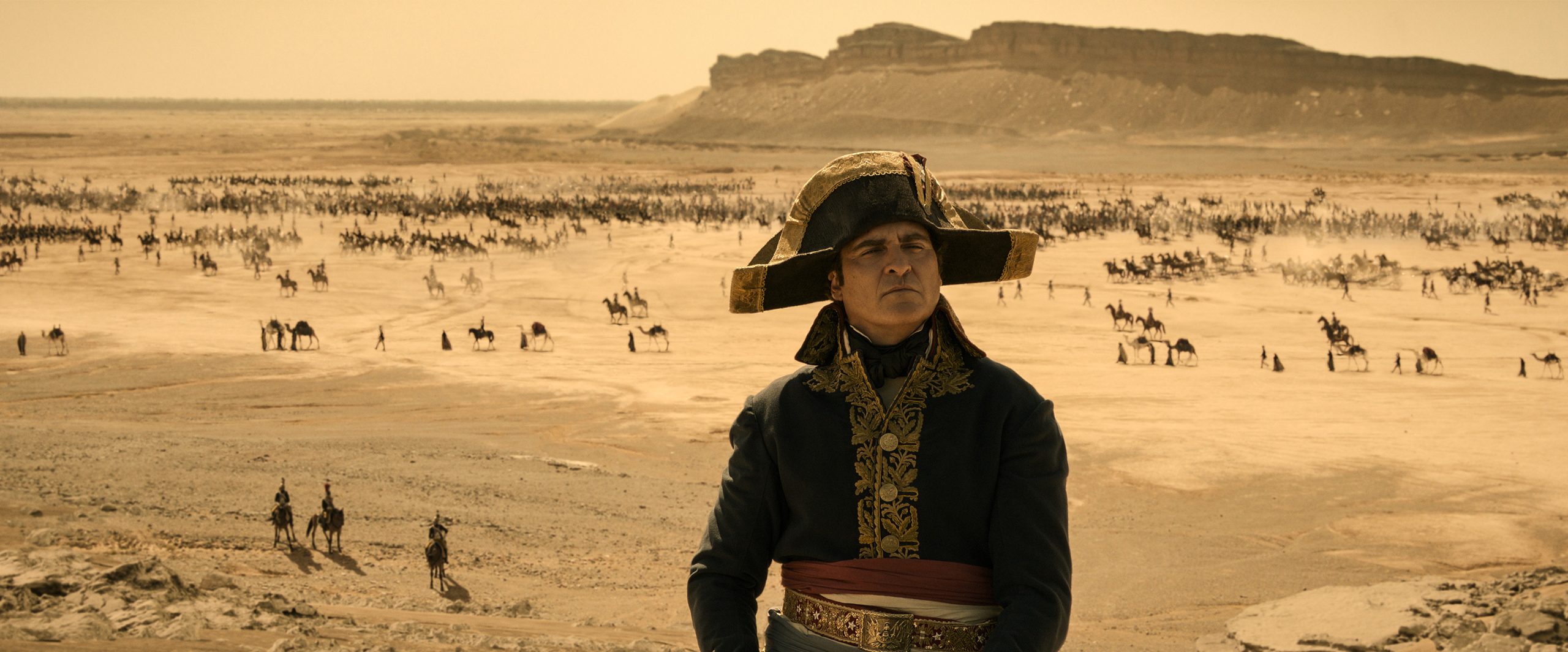History’s shortest king has been brought to the big screen by those who invented the small screen.
Apple Studios brings director Ridley Scott back into the world of the historical epic with his latest film “Napoleon.” This continent-spanning biopic is brought to life with stunning cinematography and amazing costume design but is killed by the story itself.
First, let’s look at the good. The film looks great and is shot with clarity and intention. The battle scenes are all filmed on location with wide shots that provide an astounding sense of scale as audiences watch armies of men (not computer-generated extras) race toward each other across open fields. A few of the battles take place at night, but through the use of torches, explosions and cannon fire, viewers can still follow the action. There are also incredible visuals sprinkled throughout the film. A shot of Napoleon gazing upon the Sphinx as he is sent to reclaim Egypt is breathtaking as these two historical giants are juxtaposed against one another.
The shots look even better because they display outstanding costume design. Napoleon’s military uniforms are incredible and will make the audience believe that Joaquin Phoenix is Napoleon. These costumes also cut a stunning silhouette of the title character, so when he is framed in shadow against Moscow burning down, audiences know exactly who they are looking at.
Unfortunately, people can’t judge a book by its cover. While the movie certainly looks impressive, the story is anything but. There are three scene types in this movie: Napoleon on the battlefield, the love story between Napoleon and his wife Josephine and Napoleon narrating letters to his wife between battles … and they’re all bad.
Napoleon is known as one of the greatest military minds in history who conquered most of central Europe, but viewers never get a sense of his tactical brilliance. All of the battles in the film are won by Napoleon ordering his troops to fire the cannons. While this is historically accurate, it doesn’t show the viewer Napoleon’s intelligence and how formidable he was on the battlefield. This makes the battle scenes in a movie about a military leader boring as the audience doesn’t know what is going on. If audiences got to see Napoleon strategize, it would make the battle scenes more engaging. If the audience knew what was supposed to happen beforehand, then there would be built-in stakes and a sense of tension when parts of the plan succeed or fail. Instead, audiences never get to see Napoleon formulate a plan to defeat his enemies, the battle just starts and his plan is already being carried out.
When the movie isn’t failing to show Napoleon’s military mind, it is constantly telling the audience that he is in love and misses his wife. Josephine is played well enough by Vanessa Kirby. She is a great and charismatic actress, but here she is given nothing to do and has no chemistry with Joaquin Phoenix. All their love scenes are Napoleon acting creepy and then Josephine looking as bored as the audience as Napoleon fails to please her during sex. The only good moment between them comes when Josephine calls Napoleon fat, to which he says something along the lines of, “This lamb chop was delivered to me by destiny.” It’s not like this was an emotional moment between the characters, it’s just a funny line in a dull film.
Since audiences do not believe in their love for one another, every other scene is grueling as it is just a voice-over of Napoleon’s letters to his wife between battles. Not to mention that it is the same letter every time. So every 10 to 15 minutes, Napoleon reminds the audience how much he misses his wife, how this land he conquered is for her, how he is nothing without her and how she doesn’t write to him enough.
These issues are all due to the film’s larger problem. Because the movie is trying to tell the life of Napoleon in two and a half hours, it has no time to explore or delve into anything. This is why all the love scenes tell the audience Napoleon and Josephine are in love rather than show it, and all the battle scenes show viewers that Napoleon can win battles without the strategy of how he does it. This lack of explanation undermines Napoleon’s rise to power, leading to the audience never getting the feeling that Napoleon is climbing the ranks.
The worst example of this is when Napoleon becomes emperor. Contrary to historical events, Napoleon doesn’t use his military influence or popularity with the French people to enact a coup d’état. Instead, someone tells him he should become emperor and in the next scene, he does. There is never a moment of victory or a feeling of “we made it” for the audience even though the main character has just gained control of almost all of central Europe. The movie doesn’t take the time to focus on what his life is like now that he is the ruler of France, he just goes back to leading the military like he has been doing for the entire film.
While the film has massive ambitions and a larger-than-life production value, its underdeveloped depiction of Napoleon, atrocious love story and bloated run time leave the audience with little to be excited about. This gives “Napoleon” a two and a half out of five stars.
Although this film will be huge at the Oscars, don’t rush out to see it on the big screen, wait to watch it on a small one with Apple TV+.

